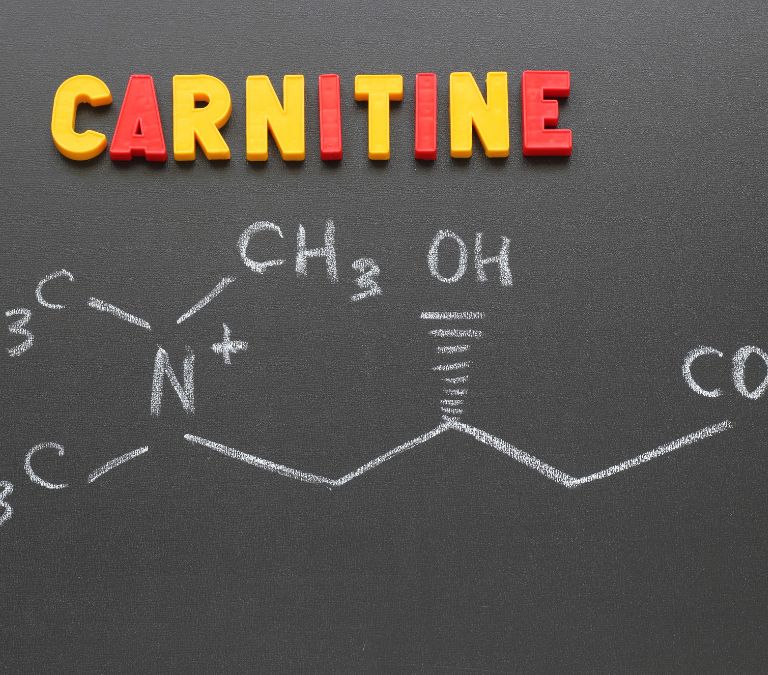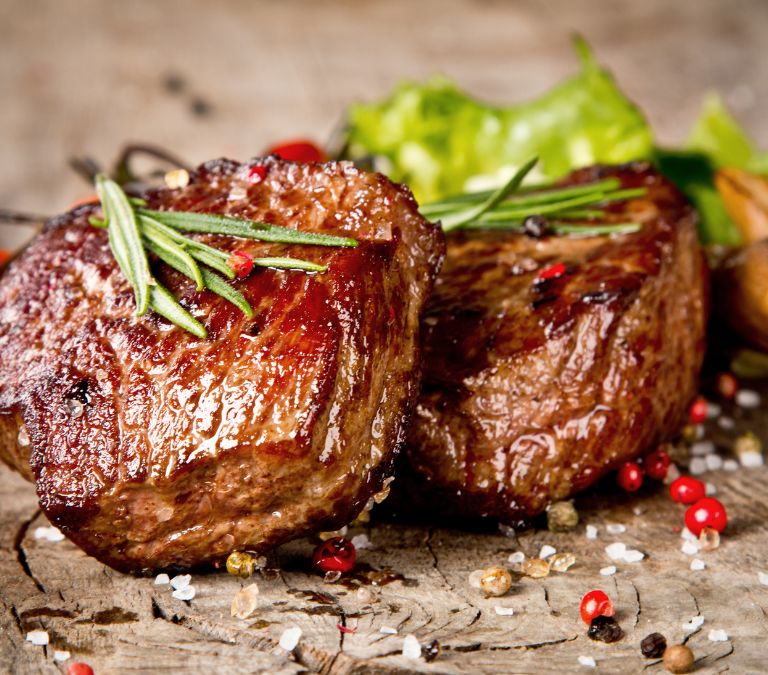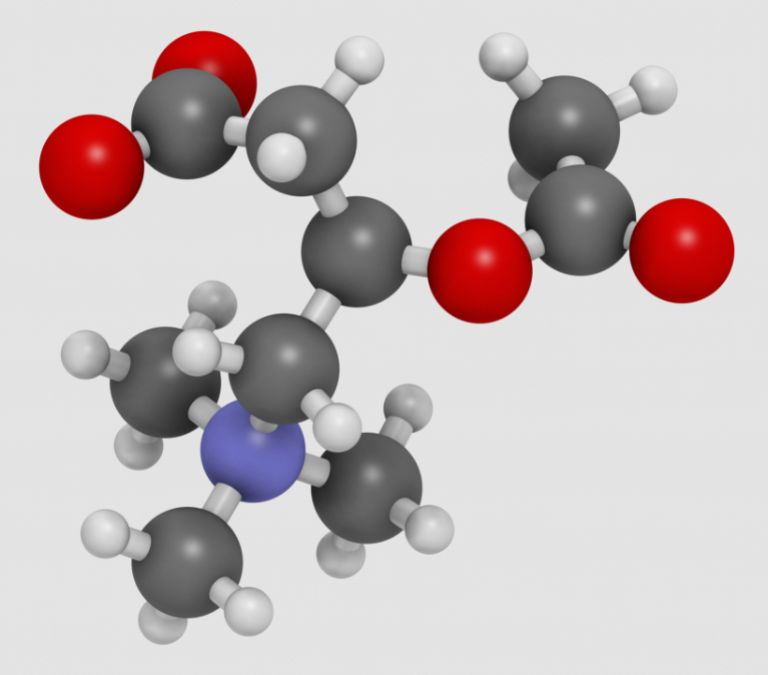The start of menopause is defined as the absence of menstruation for a continuous period of one year. When a woman reaches this stage of her life, her ovaries will no longer produce eggs. The start of menopause is not a sudden occurrence but rather one that occurs gradually over time.
The transition time from perimenopause to menopause is different for every woman. Menopause causes many different symptoms, such as changes in mood and behavior, weight gain, hot flashes, irregular vaginal bleeding, and fatigue.
Carnitine is a molecule that works in the body like a vitamin and an amino acid. It does many different things. During the synthesis process, it is made in the liver and kidneys from two important amino acids (lysine and methionine). Doctors sometimes recommend carnitine supplements to women with diabetes, heart disease, and other health problems. But it is best known for helping women lose weight because of its role in fat metabolism, especially when combined with a healthy diet and regular exercise; This is especially true when both are present.
Carnitine, which comes from the amino acid lysine, helps your body turn fat into fuel and keeps your energy levels healthy, among other things.
Benefits Of Carnitine On Menopausal Symptoms

After menopause, women are less likely to get osteoporosis and heart disease if they take carnitine. The important amino acid lysine is used in our bodies to make carnitine; This is done through a biochemical process. Most healthy women can make enough carnitine on their own, even vegetarians.
Carnitine can also be given to people who are getting hemodialysis to treat end-stage renal disease or who have genetic conditions that make them lack carnitine.
Here are 15 of the most important ways carnitine can help with menopausal symptoms:
- It improves cognitive performance
The amino acids arginine, lysine, and carnitine can help prevent some health problems with aging and help with menopausal symptoms like hot flashes, osteoporosis, and weight loss. Similarly, the amino acid carnitine helps neurons grow and develop in the brain by increasing the activity of mitochondria in cells. When taken regularly, carnitine supplements make it easier to think and remember things.
- Carnitine is a fat burner that therefore helps women with weight loss
Carnitine is an amino acid that the body makes from the amino acids lysine and methionine. It is needed to turn fat into energy. It moves fats into the mitochondria, the cell’s power plants. Carnitine is a type of amino acid called “conditionally essential.”
If your body has more carnitine, it may burn fat more efficiently; This reduces overall fat storage and visceral abdominal fat, which can cause fatty liver disease and other major health problems because it surrounds your organs.
Several randomized controlled studies and three meta-analyses have shown that women who are overweight or obese can lose a little weight by taking carnitine supplements. Obese women with type 2 diabetes took part in a study about low-calorie diets. They were given either 2 grams of carnitine per day for about eight weeks or a placebo. The study concluded that the carnitine group had better blood glucose control, insulin sensitivity, cholesterol, and triglyceride levels.
In a study with 60 overweight women with polycystic ovarian syndrome, taking 250 mg of carnitine every day for 12 weeks caused them to lose a lot of weight, have a smaller waist circumference, and have better glucose regulation and insulin sensitivity.
- It boosts your vitality before, during, and after a workout
Your strength increases when your body’s ability to burn fat. Carnitine can help you lose fat while you exercise and give you more energy, so you can work out better and live a more active life overall.
In other words, carnitine keeps your muscles from getting too acidic. Lactate builds up in the muscles after a workout, which makes them sore and tired. By eliminating lactate with carnitine, you can return to the fat-burning activity that is the most important part of your weight loss program.
- Carnitine speeds up your metabolism, making it easier to lose weight
So, it’s a good idea to add your newfound stamina to your workout routine. It will help you push yourself harder and faster, boosting your metabolism. If you have a faster metabolism, you burn more calories even when you’re not doing anything; This is a huge help if you want to lose body fat.
Carnitine helps the immune system and acts as an antioxidant. It also helps the body burn fat, lowering its overall weight.
- It helps ease the pain and other symptoms of angina
By taking carnitine supplements, a person may be able to improve the way their heart works and ease the pain of angina. For the heart to work properly, cells need to be able to make enough energy. Researchers have found that increasing the amount of carnitine you eat each day from one gram to two or three grams can help your heart work better and reduce the pain of angina.
- It improves the function of the heart
Taking carnitine supplements has been shown to improve the way the heart works, make it easier to work out, and protect the heart muscle from damage caused by insufficient oxygen. Carnitine is a molecule made from the amino acids lysine and methionine.
- It keeps you from having a sudden cardiac arrest because of trauma
Taking a carnitine supplement has been shown to help lessen the damage and effects of a heart attack.
Carnitine is an essential amino acid that helps move fats into the heart; This is important so the body can use the fats as fuel. Clinical trials have shown that people are more likely to live after a heart attack if they take 4-6 grams of carnitine daily.
- It cures persistent fatigue
Carnitine is a key part of how the body uses energy. You can fix deficiencies by taking supplements. Women who have Chronic Fatigue Syndrome (CFS) might have a problem with their mitochondria. Some women with CFS have low levels of the chemical carnitine.
In a pilot study, taking one gram of carnitine three times a day for eight weeks helped women with CFS feel better. Women with advanced cancer who took 6 grams of carnitine every day for four weeks said they felt less tired. In another study, people with advanced cancer who took up to 3 grams of carnitine daily for a week saw similar benefits.
- It helps to manage pulmonary disease.
Studies show that women with chronic lung disease who take carnitine can breathe better when they exercise.
- It lowers cardiovascular risk.
A daily carnitine supplement of 2 to 3 grams may help you lose weight, control your blood sugar, be more sensitive to insulin, and improve your lipid profile; This may lower your risk of heart disease.
The amino acid carnitine has shown promise in treating metabolic syndrome and lowering the risk of heart disease. Its benefits include better blood sugar control, insulin sensitivity, weight loss, and how fats are broken down.
- It helps lessen the tiredness caused by drugs.
Several menopause medicines seem to reduce the amount of carnitine in the body. Sixty-three percent of the drug-treated menopausal patients who took carnitine felt less tired. In an experiment, 63% of drug-treated menopausal women who took supplements of 3 to 6 grams daily felt less tired.
- It prevents Muscle tears, sprains, and other exercise-related trauma.
A clinical study found that people who take carnitine for three weeks before starting an exercise program have less muscle soreness. One randomized, controlled study found that women who took 3 grams per day for three weeks before starting an exercise plan were less likely to have sore muscles.
- It helps relieve some of the symptoms of diabetes.
Taking acetylcarnitine supplements may help ease some symptoms of diabetic neuropathy, a common side effect of type 1 diabetes.
- In several preliminary studies, the amino acid L-carnitine was found to raise “good” cholesterol levels (HDL) while simultaneously lowering “bad” cholesterol levels (triglycerides).
Several early studies found that the amino acid carnitine raises “good” cholesterol (HDL) levels while lowering “bad” cholesterol (LDL) levels (triglycerides).
Carnitine is a key part of the process by which the heart muscle burns fat. It has been said that a person’s chances of surviving a heart attack increase if they take in more carnitine before they have one.
- Carnitine can help cure Alzheimer’s disease
Acetyl-carnitine has been shown to slow the progression of Alzheimer’s disease, improve memory, and do better on cognitive and behavioral tests. Some people with Alzheimer’s may find it helpful to take this supplement. This medicine is more likely to help women younger than 66 whose cognitive abilities are worsening and whose disease is getting worse faster.
Lack of blood flow to the brain or blood flow that isn’t steady can be cured by an intravenous dose of acetyl-carnitine. People with poor blood flow to the brain may feel better for a short time.
Sources Of Carnitine
The National Institutes of Health say that most women don’t need to go out of their way to eat foods high in carnitine. However, a shortage can happen if the body can’t make enough of the vitamin on its own because of genetics or health problems. The Food and Nutrition Board of the National Academies hasn’t recommended how much carnitine you should eat daily for a healthy diet.
Lack of enough carnitine can cause an increased risk of clinical depression. A meta-analysis published in Psychosomatic Medicine in February and March 2018 found that taking carnitine supplements eases some of the symptoms of depression.
Foods Sources Of Carnitine

The bioavailability of carnitine from food varies because people eat different things. For example, one study found that carnitine was more easily absorbed by vegetarians whose diets were low in carnitine than by women whose diets were high in carnitine (regular red meat eaters).
Even though there is no maximum safe amount of carnitine, you can get from food, taking too much carnitine as a supplement may cause mild stomach problems like nausea, vomiting, and diarrhea. If you take more than 3 grams of carnitine daily, you may start to smell fishy.
Here is a list of the foods with the most carnitine.
- Red meat or beef
Red meat is a great source of carnitine. Each three-ounce serving of cooked steak or ground beef has 81 mg of carnitine.
If you’re watching your weight or trying to eat less saturated fat and calories, look for lean cuts of beef. The best choices are top sirloin, top round, bottom round, and the eye of a round.
- Pork
Pork is red meat and has more carnitine than beef. A 3-ounce serving of cooked pork has 24 milligrams of carnitine.
Lean pork cuts, such as pork tenderloin and pork sirloin roast, are better than other cuts because they have less saturated fat and more protein.
- Whole milk
There are many kinds of milk, and all of them are full of nutrients. Milk is a complete protein, meaning it has all nine amino acids the body needs. According to the University of Wyoming, it is also a great source of calcium, magnesium, phosphorus, and vitamins A and D. Carnitine is best found in whole milk (excluding meat), which has 8 mg per 8 ounces.
- Cod filets
Cod filets are high in the amino acid carnitine and are served with greens. Salmon and herring have a lot of omega-3s, but cod does not because it is low in fat. Pescatarians can get enough carnitine from codfish because a 3-ounce cooked dish has 5 milligrams.
Mercury is a dangerous chemical that builds up in fish flesh, so eating too much seafood is a worry. Cod has less mercury than other fish, which is good. The University of Minnesota Extension says pregnant women, young children, and others who could get mercury poisoning shouldn’t eat more than two servings of cod per week.
- Chicken
The chicken breast doesn’t have much carnitine, but a 3-ounce cooked serving has 3 milligrams, and those milligrams add up over time.
According to the Academy of Nutrition and Dietetics, a 3-ounce serving of boneless, skinless chicken breasts has about 140 calories, 3 grams of total fat, and 1 gram of saturated fat.
- Avocado
Avocados are one of the few plant foods that have carnitine in them. The avocado is one of the few notable fruits or vegetables with carnitine. A medium-sized avocado has 2 milligrams of carnitine in it. The fruit may also have a lot of fiber and vitamin E.
- Whole-wheat bread
Two slices of whole-wheat bread have 0.2 milligrams of carnitine, and six spears of asparagus have the same amount.
It helps older women who are losing their memories.
Supplemental sources of Carnitine
Studies have shown that carnitine interacts badly with antibiotics linked to pivalate, like pivampicillin, which are used to prevent urinary tract infections over the long term. The excreted carnitine increases when these antibiotics are used for a long time; This can cause the amount of carnitine in the body to go down. But even though tissue carnitine levels can get low enough to stop fatty acid oxidation, a lack of carnitine has never been linked to sickness.
It has been shown that taking valproic acid, phenobarbital, phenytoin, or carbamazepine, anticonvulsant drugs, can drastically lower the amount of carnitine in the blood. Also, using valproic acid, with or without other anticonvulsants, could cause hepatotoxicity and a rise in plasma ammonia levels, leading to encephalopathy. This poisoning can also happen when too much valproic acid is taken. Valproic acid poisoning in children and adults may be treated with carnitine, but the best way to give it has not been figured out.
Dietary supplements like carnitine, acetyl-carnitine, and propionyl-carnitine, which are all sources of carnitine, can be bought without a prescription. Carnitine is often recommended to help women lose weight, get more out of their workouts, and feel better overall. It is also a medicine approved by the Food and Drug Administration (FDA) to treat primary and secondary forms of carnitine deficiency syndrome.
The bioavailability of carnitine from food is quite high, while absorption of oral carnitine supplements is much lower (see Dietary carnitine for further information). The bioavailability of oral carnitine supplements ranges from 5% to 25% of the whole dose. Even though it is likely that acetyl-L-(ALCAR) carnitine is more bioavailable than carnitine, not much is known about how it works in the body.
Studies done in vitro showed that some of the ALCAR taken in could be broken down into smaller pieces while in the digestive system. After 50 days, patients who were given 2 g/day of ALCAR had a 43% rise in plasma ALCAR levels; This could mean that ALCAR was absorbed without being broken down first or that carnitine was re-acetylated in the enterocytes. Both of these things could happen.
How Does The Body Use And Absorb Carnitine?

Adults who eat a mixed diet of red meat and other animal products take about 60–180 mg of carnitine daily. Vegans get a lot less because they don’t eat foods that come from animals. The small intestine absorbs and moves most carnitine from food into the bloodstream.
Even foods low in carnitine have little effect on the amount of carnitine in the body because the kidneys store it well. The kidneys get rid of extra carnitine in the urine instead of digesting it to keep the amount of carnitine in the blood steady,
When can carnitine deficiency occur?
There are two different types of carnitine deficiency. Carnitine deficiency is a genetic condition that affects the cellular carnitine-transporter system. Symptoms, such as cardiomyopathy, skeletal muscle weakness, and low blood sugar, often appear when a child is five years old. Secondary carnitine deficiencies can happen when certain diseases, like chronic renal failure, or environmental factors, like the use of certain antibiotics, change how much carnitine is absorbed or excreted. There is a lot of agreement about how well carnitine works as a prescription drug to fix these problems.
Does eating too much carnitine cause any health problems?
When taken in about 3 grams daily, carnitine supplements can cause stomach problems like nausea, vomiting, stomach cramps, diarrhea, and a “fishy” body odor. Less common side effects include muscle weakness in women with uremic syndrome and seizures in women who already have seizure disorders.
Some studies say that the breakdown of carnitine, which creates a chemical called TMAO, is caused by bacteria in the gut. People think that TMAO makes you more likely to get heart disease. This effect makes people who eat meat more likely to be hurt than vegetarians or vegans. These discoveries’ effects are yet unknown, and more research is needed.
Conclusion
Carnitine can help mild memory loss in menopausal women. Carnitine can help with both mental and physical fatigue during menopause. It also makes you feel less tired after exercise. Carnitine may help women between 30 and 60 whose alcohol use has made them less smart.
The symptoms of diabetic neuropathy seem to get better when you take extra carnitine. Carnitine might be most helpful for women with type 2 diabetes who don’t take care of it well or who haven’t had diabetes for a long time.
Brain function gets worse when the liver doesn’t work well for a long time. Women with liver disease who have trouble with their brain function may benefit from taking carnitine, which boosts physical performance. When the amount of ammonia in the blood drops, it’s a sign that the liver could benefit.
Most of all, carnitine is important for getting fatty acids used as fuel to the mitochondria. There is a lot of science behind the idea that carnitine could help you lose weight.
Carnitine is a weight loss aid because it helps the body break down fat. You can lose more fat by taking carnitine, making you less hungry and tired.







